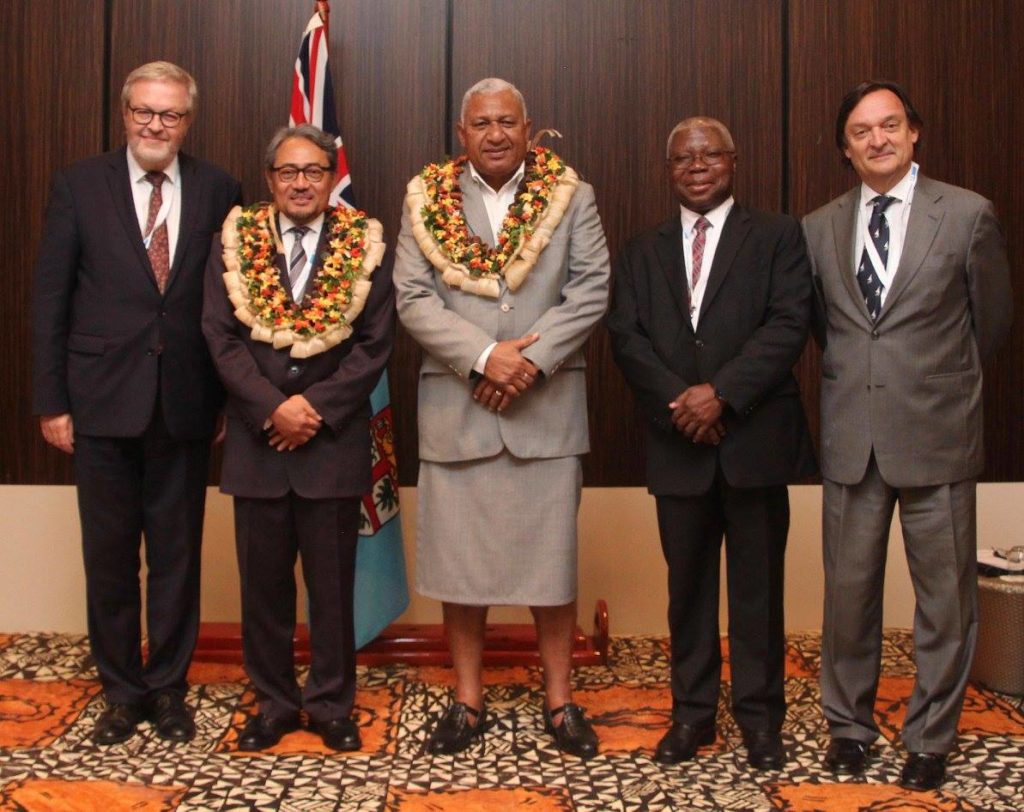
Location
Natadola, FijiAttendance
Invitation Only
Date & Time
Start: 27/10/16 00:00
End: 28/10/16 00:00
NATADOLA, FIJI – 27-28 OCTOBER 2016 On 27-28 October 2016, more than 60 participants attended the regional workshop for Pacific Small Island States (PSIDS) held in Fiji on benefits of and challenges to ratifying and implementing the UN Convention against Torture and Other Cruel, Inhuman or Degrading Treatment or Punishment […]
NATADOLA, FIJI – 27-28 OCTOBER 2016

On 27-28 October 2016, more than 60 participants attended the regional workshop for Pacific Small Island States (PSIDS) held in Fiji on benefits of and challenges to ratifying and implementing the UN Convention against Torture and Other Cruel, Inhuman or Degrading Treatment or Punishment (UNCAT)
The Pacific conference was an important step in the CTI’s work towards universal ratification and better implementation of the UNCAT. The event, hosted by the Government of Fiji and the CTI was also supported by the Universal Rights Group (URG) and the Association for the Prevention of Torture (APT). The workshop was jointly facilitated by Mr. Mark Thomson, APT Secretary General, H.E. Ambassador Carsten Staur, Permanent Representative of Denmark to the UN in Geneva, and Mr. Marc Limon, Executive Director of URG.
In total, 10 PSIDS attended the workshop – 8 PSIDS that are considering ratifying the UNCAT (Kiribati, Marshall Islands, Palau, Papua New Guinea, Samoa, Solomon Islands, Tonga and Tuvalu) and 2 Pacific States that are already party to the Convention (Fiji and Vanuatu). The event was also attended by representatives from the CTI core States of Chile, Denmark, Ghana and Indonesia, CTI friends (Australia, New Zealand, UK and USA), the EU, OHCHR, UNDP, the UN Committee against Torture, and international policing anti-torture experts.
After a traditional Fijian welcoming ceremony, the workshop was officially opened by Honourable Mr. Frank Bainimarama, Prime Minister of Fiji, H.E. Ambassador Triyono Wibowo, Permanent Representative of Indonesia to the UN in Geneva (on behalf of the CTI core group), and UN High Commissioner for Human Rights Zeid Ra’ad Al Hussein (via pre-recorded video message).
Honourable Mr. Aiyaz Sayed-Khaiyum, Attorney General of Fiji, shared Fiji’s ratification experience by highlighting a shift in government policy and the involvement of multiple stakeholders as crucial in their decision to move towards ratification of the Convention.
The first day of the workshop heard interventions by PSIDS on challenges and obstacles to ratification. Many PSIDS expressed their interest in ratifying the Convention noting the benefits that can arise from doing so, for example in relation to more effective policing and criminal investigation and in establishing more professional and effective police services, however, of the challenges highlighted many related to human and technical capacity. This regional event was a first step by the CTI towards supporting States with such challenges. Participants heard from the Seychelles, who shared their good practices on how to overcome reporting challenges, including by debunking myths on the reporting obligation and providing possible solutions. The member of the UN Committee against Torture, Mr. Abdelwahab Hani, gave an overview of the main provisions of the Convention and also shared the Committee’s views on reporting, while APT’s Rebecca Minty helpfully explained the process of ratification.
The second day focused on reviewing police procedures and improving criminal investigations by hearing good practices from PSIDS and anti-torture experts, including (now former) UN Special Rapporteur on Torture, Mr. Juan Mendez (via pre-recorded video message) introducing his latest report calling for the adoption of a universal protocol on investigative interviewing and attendant safeguards, Mr. Mike Kellett, retired police investigator from the United Kingdom, on safeguards upon arrest and detention, and Dr. Asbjørn Rachlew, Superintendent of Norwegian Police (on leave from) on the development and implementation of the concept of investigative interviewing techniques.
The second day also discussed anti-torture legislation, with a focus on the CTI-APT anti-torture law guide.
The workshop took a solutions-oriented approach by offering PSIDS a range of options and good practices that can be tailored to their national contexts. Support was offered in assisting them to overcome challenges to UNCAT ratification and implementation. It was observed that solutions need not be complex. With the positive experience of Fiji as the most recent PSIDS to have ratified the Convention, PSIDS left the workshop encouraged to take ratification and improved implementation to the national level and reassured that CTI, APT, OHCHR, EU and other partners would stand ready to assist.

